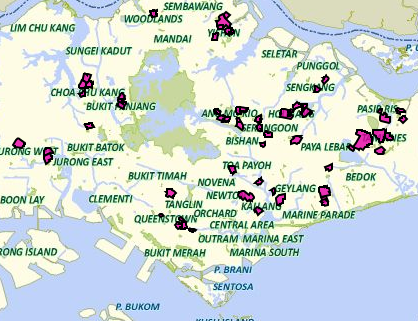Singapore recorded 4,632 dengue cases in 2012. This year it went up to 9,847 already. This is a record high for Singapore which last experienced a dengue outbreak in 2005.
The National Environment Agency (NEA) has launched the ‘Do the Mozzie Wipeout’ campaign to promote awareness about dengue prevention:
Singapore cannot fight dengue without the community’s action to remove mosquito breeding in their homes. The Aedes mosquito breeds in artificial containers mainly found in homes, and its life-cycle averages seven days. Hence it is imperative for all to do the Mozzie Wipeout together to break the breeding cycle.
 Aside from maintaining a dengue information portal, the NEA also has a Facebook page to educate the public about government and community efforts to fight dengue. It also uses a mapping system to categorize dengue cases into clusters:
Aside from maintaining a dengue information portal, the NEA also has a Facebook page to educate the public about government and community efforts to fight dengue. It also uses a mapping system to categorize dengue cases into clusters:
A dengue cluster is formed when 2 or more dengue cases occur within 14 days and the homes of the dengue victims are within the distance of 150m.
Mr Miyagi reminds readers that construction sites are not the only breeding ground of mosquitoes which carry the dengue virus:
The NEA has reported that the majority of sites found to have bred mosquitoes have been homes. Now I’m not saying that the construction sites are not responsible at all, but the fact remains that no matter how much you want to blame someone else or some other site for the spread of this disease, the solution to breaking the vector cycle of is still firmly in your own hands.
The government plans to distribute 1.2 million bottles of insecticide to all households next month. My Singapore News has a suggestion: free medical treatment for dengue patients
Bertha Harian is proposing a ‘dengue shock syndrome approach’ to make people aware of the seriousness of the outbreak:Apart from giving free insect repellants, maybe it is time that all dengue patients should be given free medical treatment. This will encourage every dengue patient to come forward for treatment and will cut down the source of virus carriers in the chain.
Much money has been thrown into the business of making people aware of the dengue danger, and “reality’’ videos are supposed to be hitting computer screens as well. Perhaps, a dengue shock syndrome approach should be applied to the campaign to get under the skin of those who don’t think dengue will happen to them.
Blogging for Myself argues that it is not enough to report the dengue problem in terms of numbers:
The story and danger must be much better told.
And my simple probability calculations is wrong because it grossly oversimplifies the story. We are actually looking a situation with a potential of going exponential or in layman's terms ballistic. This risk is not widely made know to the population. Not a bad idea to frighten people a little with the truth.
The outbreak also led netizens to discuss the health care situation in Singapore. Writing for The Online Citizen, Terry Xu asks if hospitals are giving adequate attention to dengue patients:
Given that more than 8,000 people have come down with dengue fever since the start of the year, why given the current dengue fever epidemic that fever patients are not given special attention?
Is there enough beds in the hospital where patients can stay to be observed by the medical professionals?
Leong Sze Hian and Roy Ngemg probe the government’s health care spending and public health policies:
…we do not just have foreigners and PRs literally fighting for stretched healthcare facilities and capacity in Singapore, but we may also be competing against foreign medical tourists who can pay higher non-subsidised fees (and arguably sometimes may be able to jump the queue – to the detriment of Singaporeans seeking subsidised medical treatment)








2 comments